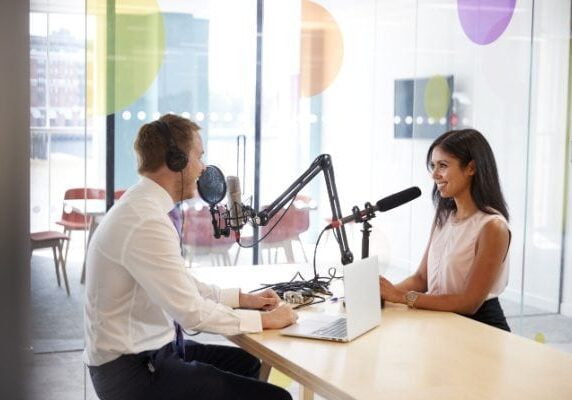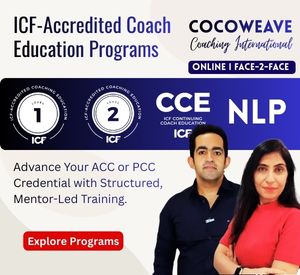As a professional coach and the face of your business, you may encounter opportunities to promote your business in the media, including digital and print interviews, radio and podcast appearances, or television (TV) spots. Leveraging these opportunities is a chance for you to showcase your expertise and generate awareness around the effectiveness of coaching. As an experienced coach, you may have a few interviews under your belt. However, if you are new to media interviews, don’t worry; we’ve got you covered!
During any interview, it is important to remember that you are always on the record. Anything you say to a reporter might be used in a published work, so it is crucial to take the following steps to prepare before any media engagement. Here are a few interview basics to keep in mind when preparing:
- You are the expert: Your job is to provide information on a specific topic or subject. It is up to you to control the agenda, deliver the message, and reach your audience effectively. If the reporter makes an incorrect statement, politely correct them, and ensure the interview content is accurate and credible.
- Control the discussion: Do your research. Conduct an audit on the interview topic before your conversation to ensure you are up to date with current events and prepared to speak to any new findings. Performing a media audit ahead of your interview will give you a sense of the outlet and reporter’s past coverage and any biases surrounding the topic of conversation.
- Stick to your talking points: Talking points will guide you during an interview, helping you stay focused and conveying key messages effectively while providing a framework for organizing your thoughts, ensuring consistency, and delivering a clear and impactful message to the audience. Anticipate potential questions and prepare appropriate responses to allow you to handle interviews confidently and professionally. Remember that although talking points are helpful, you should be prepared to navigate the natural flow of conversation and avoid reading from a script.
- Practice, practice, practice: Build your confidence through practice mock interviews. Respond to potential questions, anticipate follow-up questions, and address potential challenges. Practice will help you address any weak points, refine your thoughts, and articulate your ideas clearly. This will help you feel more prepared and self-assured.
Now that you have a basic understanding of best practices for media interviews, let’s dive into some tips and tricks to help you navigate a successful interview in different mediums:
Digital/Print
A reporter or one-on-one interview can take place in person or virtually and involves a conversation between the interviewer and you, the subject matter expert. Before your interview, research the reporter and the outlet. Familiarize yourself with their background and previous work. Building a positive relationship with the reporter can lead to future opportunities.
Radio and Podcast
Radio and podcast interviews can be held via phone or in person at a recording studio. Understand the show’s format, whether it’s a live broadcast, recorded episode, or interview-style conversation and whether it is audio only or audio and video Prepare your talking points accordingly. Engage with the host and audience to effectively communicate your messages and make the most of the opportunity to reach a wider audience.
Television
Prepare the same way for a digital, print, radio, and podcast interview, but remember that TV interviews are primarily visual. Before participating in a TV interview, remember:
- Dress: Dress professionally and appropriately for the interview. Choose clothing that is well aligned with the context and reflects your personal brand. Avoid distracting patterns, logos, or overly flashy clothing. However, wearing clothing with your brand’s logo can increase visibility for you and your business.
- Body language: Maintain good posture and eye contact with the interviewer. Use open and confident body language to convey engagement and interest.
- Engage: TV interviews require a certain energy level to captivate the audience. Show enthusiasm and passion for your subject matter while also maintaining authenticity. Speak clearly, project your voice, and vary your tone to maintain interest and engage the audience. When listening to the interviewer, remain engaged.
It’s Showtime!
Media interviews are a great way to demonstrate your coaching expertise, attract new clients, and amplify the power of coaching. With proper preparation, you can showcase your qualifications, maximize your chances of success in an interview, and make a positive and memorable impression on the interviewer and their audience.
Disclaimer
The views and opinions expressed in guest posts featured on this blog are those of the author and do not necessarily reflect the opinions and views of the International Coach Federation (ICF). The publication of a guest post on the ICF Blog does not equate to an ICF endorsement or guarantee of the products or services provided by the author.
Additionally, for the purpose of full disclosure and as a disclaimer of liability, this content was possibly generated using the assistance of an AI program. Its contents, either in whole or in part, have been reviewed and revised by a human. Nevertheless, the reader/user is responsible for verifying the information presented and should not rely upon this article or post as providing any specific professional advice or counsel. Its contents are provided “as is,” and ICF makes no representations or warranties as to its accuracy or completeness and to the fullest extent permitted by applicable law specifically disclaims any and all liability for any damages or injuries resulting from use of or reliance thereupon.
Authors
Post Type
Blog
Audience Type
Experienced Coaches, External Coaches, ICF Chapter Leaders, Internal Coaches, Mentor Coaches, New Coaches, Professional Coaches, Team and Group Coaches
Topic
Business Development
Related Posts
How to Use LinkedIn to Establish Thought Leadership
LinkedIn offers coaches a powerful opportunity to attract new clients, establish thought leadership, and grow…
Personal Branding for Coaching — Amplified by AI
How can you stand out as a coach in a crowded market…
The Executive Coaching Blueprint: Positioning, Pricing, and Performance
Transitioning from corporate to coach can feel like uncharted territory for many…







